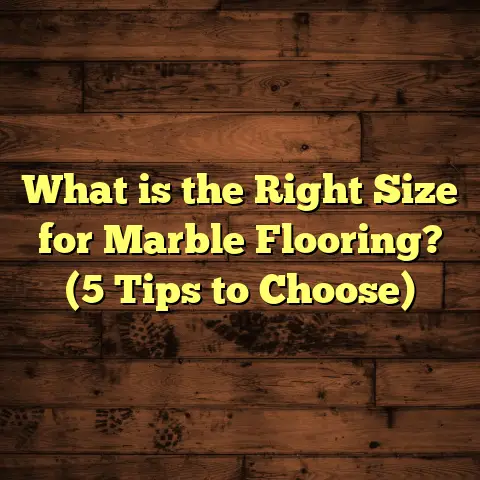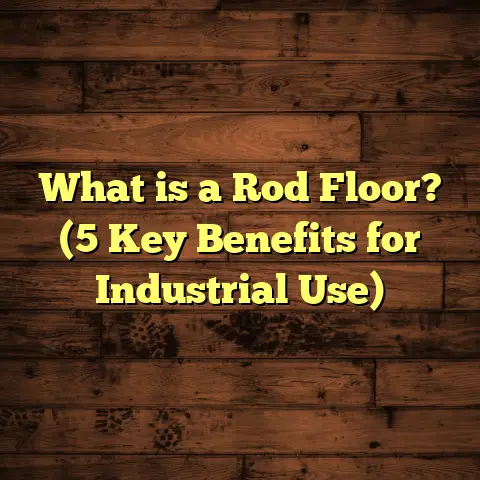What is the Best Flooring for Basements? (5 Key Factors Revealed)
What is the Best Flooring for Basements?
I remember when I first decided to renovate my basement. It was this cold, damp space that felt more like a storage dungeon than a part of my home. I needed that basement to be a cozy hangout spot for my family, a place where kids could play and I could relax after work or even host friends. But picking the right flooring wasn’t easy. I wanted something that looked good, felt comfortable, and—most importantly—could stand up to the moisture and occasional spills that basements are notorious for.
After many trials, errors, and digging through piles of research and advice, I figured out what works best in these tricky spaces. Today, I want to share everything I’ve learned about basement flooring with you. Whether you’re planning a full renovation or just replacing the floor, this article will help you understand the key factors to consider and which materials tend to perform best.
What is Basement Flooring and Why Does It Matter?
Let’s start with the basics: what exactly is basement flooring? At its core, basement flooring is simply the material laid over the floor of a basement space. But unlike flooring in most parts of your house, basement floors face unique challenges.
Why? Because basements are usually below ground level or partially so. This means they deal with:
- Higher moisture levels from groundwater or condensation.
- Cooler temperatures due to insulation limitations.
- Potential for flooding or water seepage.
- Increased risk of mold or mildew if conditions aren’t controlled.
All this means picking a flooring material for your basement isn’t just about looks or comfort—it’s about durability and performance under conditions many other rooms don’t face.
When choosing basement flooring, you’re balancing several needs:
- Moisture resistance: Can it handle wet conditions without warping or molding?
- Warmth and comfort: Is it comfortable underfoot, especially in colder months?
- Durability: Will it withstand heavy foot traffic, furniture movement, and playtime chaos?
- Maintenance: How easy is it to clean and keep looking good?
- Cost: Does it fit your budget both upfront and long term?
Knowing how each flooring option stacks up on these points will save you time and money in the long run.
Five Key Factors I Use When Choosing Basement Flooring
I’ve found that focusing on these five key factors helps me—and my clients—make smart decisions about basement flooring:
1. Moisture Resistance — The Number One Basement Challenge
Moisture is the biggest enemy for basement floors. According to the U.S. Environmental Protection Agency (EPA), roughly 60% of basements experience some moisture issues, whether from leaks, condensation, or high humidity.
If your flooring isn’t moisture-resistant, problems like buckling, warping, mold growth, stains, and unpleasant odors are almost guaranteed.
Here’s what I’ve learned about moisture and basement floors:
- Concrete slabs are often damp beneath the surface. Even if they feel dry, moisture can rise through capillary action.
- Vapor barriers installed beneath flooring materials can reduce moisture intrusion significantly.
- Some materials like vinyl, ceramic tile, and epoxy coatings are naturally waterproof and do well.
- Others like traditional hardwood or carpet absorb moisture and deteriorate quickly unless special precautions are taken.
A personal story: I once worked on a basement project where the homeowner insisted on carpet because it felt cozy. Within a year, the carpet had a musty smell and visible mold patches underneath. We had to rip it out and replace it with vinyl plank flooring after adding a vapor barrier. That experience made me realize how critical moisture resistance really is.
2. Comfort and Warmth — Making the Basement Livable
Basements tend to be cold because they sit below ground level where temperatures are cooler year-round. Walking barefoot on cold tile or concrete can be uncomfortable during winter months.
When I renovated my own basement, I prioritized comfort. I chose cork flooring because it’s soft underfoot and has natural insulation properties that help keep floors warmer compared to tile or vinyl.
Other options like carpet can add warmth but come with moisture risks unless you use moisture-resistant padding and control humidity carefully.
If you want warmth without sacrificing durability, consider:
- Cork flooring (natural insulation)
- Carpet tiles designed for basements (water-resistant types)
- Adding radiant floor heating beneath tiles or vinyl
I’ve had several clients install radiant heat under tile floors in their basements, which made all the difference during cold winters. It added upfront cost but paid off in comfort.
3. Durability Against Wear and Tear — Handling Life’s Chaos
Basements often serve multiple purposes: family playrooms, home gyms, workshops, or guest rooms. This means flooring must be tough enough to handle heavy foot traffic, dropped objects, furniture movement, and sometimes even pet claws.
Vinyl plank flooring has been my favorite for durability because:
- It resists scratches and dents better than hardwood.
- It’s waterproof so it doesn’t swell from spills.
- It comes in a wide range of styles mimicking wood or stone.
Tile is also extremely durable but can crack if heavy things fall on it. Engineered hardwood offers some durability improvements over solid wood but still requires care.
In one project for a client with kids and dogs, we used luxury vinyl plank flooring throughout the basement play area. Two years later—it still looks brand new even with daily rough use.
4. Maintenance — Keeping Floors Looking Good Without Hassle
Nobody wants to spend hours cleaning or worry about staining every time someone spills something.
Vinyl and tile floors are easy to clean—usually just sweeping and mopping. Carpet can trap dust and odors and may develop mold if exposed to dampness.
I always advise clients to think about how much maintenance they’re willing to handle. For example:
- Epoxy-coated concrete floors only need occasional mopping.
- Cork floors need sealing every few years to maintain water resistance.
- Carpet requires regular vacuuming and occasional deep cleaning.
Choosing low-maintenance floors reduces stress long term.
5. Cost Effectiveness — Balancing Budget with Quality
Budget often influences decisions more than we want to admit. Basement flooring prices vary widely:
| Flooring Type | Average Cost per sq.ft. (Material + Installation) |
|---|---|
| Carpet | $3 – $7 |
| Vinyl Plank | $3 – $8 |
| Engineered Hardwood | $6 – $12 |
| Ceramic Tile | $7 – $15 |
| Cork | $5 – $10 |
Cheaper options like carpet or basic vinyl seem attractive upfront but may lead to costly repairs or replacement if moisture damages them.
Spending a bit more on quality vinyl plank or engineered wood designed for basements usually saves money over time because they last longer and require fewer repairs.
How Basement Conditions Affect Flooring Choices
One thing I always stress before recommending materials is understanding your basement’s current condition because it really matters.
Humidity Levels
Using a hygrometer, you can measure relative humidity in your basement. Ideally, you want it below 60% to prevent mold growth.
High humidity means you should avoid porous materials like carpet or solid wood unless you have excellent ventilation or dehumidifiers.
Water Seepage History
Has your basement flooded before? Do you see water stains or damp spots on walls?
If yes, vinyl plank flooring or tile with proper sealing is safest. Avoid wood-based products unless you fix leaks first.
Concrete Slab Condition
Is your slab cracked or uneven? Cracks can allow moisture through or cause tiles/planks to lift if not fixed before installation.
Insulation Status
Basements with poor insulation tend to be colder and damper. Adding insulation before flooring installation improves comfort and protects floors from damage caused by temperature swings.
Personal Stories from Basement Flooring Projects
I want to share a few stories from my projects that highlight what works—and what doesn’t—in real life.
Story 1: The Carpet Disaster
A young couple wanted their basement finished quickly on a tight budget. They chose wall-to-wall carpet because it was cheap and warm. Within six months, they noticed a musty smell and patches of mold growing underneath near a window where water seeped through during rainstorms.
We had to rip out the carpet completely and install luxury vinyl plank after treating the area with mold inhibitors and installing a vapor barrier underneath. The lesson? Don’t ignore moisture risks just to save money upfront.
Story 2: The Luxury Vinyl Success
Another client had a large basement used as a family hangout and workout space. We installed luxury vinyl plank flooring throughout because:
- It’s waterproof.
- Easy to clean after gym sweat or spilled drinks.
- Durable enough for kids running around.
Two years later, they’re thrilled with how little maintenance it requires and how good it looks even after heavy use.
Story 3: Warmth with Cork
I installed cork flooring in my own basement rec room because I didn’t want cold feet during winter movie nights. The floor feels soft and warm underfoot. Yes, cork needs sealing every few years but it’s worth it for the comfort it provides.
The Science Behind Flooring Choices
There’s plenty of research backing up what works best in basements:
- The National Association of Home Builders (NAHB) reports that 35% of basement floor failures are due to moisture damage.
- Vinyl plank flooring has seen a 15% annual sales increase over recent years because of its water resistance and durability.
- Studies show that radiant floor heating paired with tile or vinyl significantly improves comfort levels in cold basements.
- According to industry experts, proper subfloor preparation including vapor barriers reduces flooring failure rates by up to 50%.
In-Depth Look at Popular Basement Flooring Options
Let me break down popular basement flooring types based on my experience and research:
Vinyl Plank Flooring
Pros:
- Waterproof and highly resistant to moisture.
- Durable against scratches and dents.
- Wide variety of styles mimicking wood or stone.
- Affordable compared to engineered hardwood or tile.
- Easy installation (many options for DIY).
Cons:
- Can feel less “natural” underfoot compared to wood.
- Some cheaper types may emit VOCs; choose low-VOC certified products.
My Take: This is my top recommendation for most basements because it balances durability, cost, aesthetics, and moisture resistance so well.
Ceramic or Porcelain Tile
Pros:
- Completely waterproof.
- Very durable surface.
- Easy to clean.
- Wide style options including natural stone looks.
Cons:
- Cold underfoot unless radiant heating added.
- Can crack if heavy objects fall.
- Installation costs tend to be higher.
My Take: Great if you want a waterproof durable surface and don’t mind adding rugs or radiant heat for warmth.
Engineered Hardwood
Pros:
- Looks like real hardwood with better moisture resistance than solid wood.
- Adds warmth compared to tile.
Cons:
- Still vulnerable if moisture levels aren’t controlled well.
- More expensive compared to vinyl plank.
My Take: Use only if your basement is very dry and has proper vapor barriers; otherwise risk damage increases.
Cork Flooring
Pros:
- Soft and warm underfoot.
- Natural insulation properties.
Cons:
- Needs sealing against moisture every few years.
- Not as durable as vinyl or tile under heavy wear.
My Take: Excellent choice if warmth/comfort is priority but only if you commit to maintenance routines.
Carpet
Pros:
- Warmest option.
- Softest surface for kids playing.
Cons:
- High risk of mold growth in damp basements.
- Stains easily; hard to keep fresh smelling.
My Take: Avoid unless basement is extremely dry with controlled humidity; consider carpet tiles as an alternative for easy replacement.
Installation Tips I Follow for Basement Flooring
Even the best materials fail if installed incorrectly. Here are some tips from my own practice:
- Check moisture levels before installation using reliable meters.
- Install vapor barriers under all flooring except tile (which needs proper sealing).
- Level your concrete slab carefully before laying any floor materials.
- Leave expansion gaps for planks/wood floors to prevent buckling.
- Use mold-resistant adhesives when gluing down floors.
- Consider professional installation for engineered hardwood or tile due to complexity.
Budget Breakdown: How Much Should You Expect?
Here’s a rough idea of total costs including installation based on typical basement sizes (800 sq.ft.):
| Flooring Type | Material Cost | Installation Cost | Total Cost Estimate |
|---|---|---|---|
| Carpet | $1,600 | $800 | $2,400 |
| Vinyl Plank | $2,400 | $2,000 | $4,400 |
| Engineered Hardwood | $4,800 | $3,200 | $8,000 |
| Ceramic Tile | $5,600 | $6,000 | $11,600 |
| Cork | $3,200 | $2,400 | $5,600 |
I always tell clients that spending a bit more upfront on durable materials can save thousands in replacements later—especially in basements prone to moisture issues.
How To Protect Your Basement Floor Long-Term
Once you pick your floor, protecting it matters:
- Use dehumidifiers during humid seasons to keep basement relative humidity below 50%.
- Clean spills promptly to avoid stains or water damage.
- Place mats at entryways to reduce dirt tracked inside.
- Inspect periodically for cracks or gaps where water might seep in.
- Seal grout lines in tile floors every few years.
Common Questions I Get About Basement Flooring
Q: Can I install hardwood floors in my basement?
A: Solid hardwood isn’t recommended due to moisture risks; engineered hardwood can work if your basement is dry with proper vapor barriers.
Q: Is laminate good for basements?
A: Traditional laminate doesn’t handle moisture well—it tends to swell when wet. Water-resistant laminates exist but I still prefer vinyl plank.
Q: What about radiant heating under tile?
A: Radiant heat makes tiles much more comfortable in basements but adds cost and complexity during installation.
Q: Can I DIY basement flooring?
A: Vinyl plank often is DIY-friendly if subfloor prep is good; tile or engineered wood usually requires professionals for best results.
Wrapping Up My Basement Flooring Journey
I’ve spent countless hours researching products, testing materials myself, listening closely to homeowners’ stories, and seeing firsthand how different floors hold up over time in basements. Here’s what stands out most:
- Moisture resistance is non-negotiable—don’t cut corners here.
- Comfort matters because basements tend to be cold.
- Durability should match your lifestyle—kids? Pets? Workout equipment?
- Maintenance should fit your willingness level—some floors need more care than others.
- Budget smartly—not always cheapest upfront but best overall value wins.
If you remember just these five factors when choosing your basement floor—and pair that with proper subfloor prep—you’ll be well on your way to creating a space that’s both beautiful and built to last.
Feel free to ask me any questions about your particular situation—I’m happy to share what works best based on years of experience and research!





